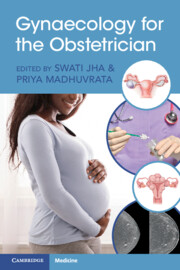Book contents
- Gynaecology for the Obstetrician
- Gynaecology for the Obstetrician
- Copyright page
- Dedication
- Contents
- Contributors
- Foreword
- Preface
- Chapter 1 Ovarian Cysts in Pregnancy
- Chapter 2 Fibroids in Pregnancy
- Chapter 3 Cervical Abnormalities in Pregnancy
- Chapter 4 Vulval Disorders in Pregnancy
- Chapter 5 Congenital Uterine Malformations and Vaginal Anomalies
- Chapter 6 Vaginal Prolapse and Previous Prolapse Surgery
- Chapter 7 Urinary Tract Problems in Pregnancy
- Chapter 8 Previous Third and Fourth Degree Tears
- Chapter 9 Management of Post-Partum Retained Placental Remnants
- Chapter 10 Gestational Trophoblastic Disease (GTD)
- Chapter 11 Female Genital Mutilation
- Chapter 12 Ovarian and Cervical Malignancy in Pregnancy
- Chapter 13 Post-Partum Contraception
- Chapter 14 Pregnancy Associated Breast Cancer
- Index
- References
Chapter 14 - Pregnancy Associated Breast Cancer
Published online by Cambridge University Press: 14 July 2023
- Gynaecology for the Obstetrician
- Gynaecology for the Obstetrician
- Copyright page
- Dedication
- Contents
- Contributors
- Foreword
- Preface
- Chapter 1 Ovarian Cysts in Pregnancy
- Chapter 2 Fibroids in Pregnancy
- Chapter 3 Cervical Abnormalities in Pregnancy
- Chapter 4 Vulval Disorders in Pregnancy
- Chapter 5 Congenital Uterine Malformations and Vaginal Anomalies
- Chapter 6 Vaginal Prolapse and Previous Prolapse Surgery
- Chapter 7 Urinary Tract Problems in Pregnancy
- Chapter 8 Previous Third and Fourth Degree Tears
- Chapter 9 Management of Post-Partum Retained Placental Remnants
- Chapter 10 Gestational Trophoblastic Disease (GTD)
- Chapter 11 Female Genital Mutilation
- Chapter 12 Ovarian and Cervical Malignancy in Pregnancy
- Chapter 13 Post-Partum Contraception
- Chapter 14 Pregnancy Associated Breast Cancer
- Index
- References
Summary
Pregnancy associated breast cancer (PABC) is rare, accounting for 40 per 100 000 cases of breast cancer in the UK and 4% in women diagnosed under 45 years of age. It includes breast cancer diagnosed during pregnancy and the 12 months after delivery. Diagnosis is often delayed as changes in the breast can be ascribed to pregnancy, rather than malignancy. Prognosis is worse than in non-pregnant women. In addition to the severe psychological distress caused by the diagnosis during or soon after pregnancy, there are a number of differences in the management of breast cancer regarding the health of the pregnancy and the unborn child. In general, most treatments should be avoided in the first trimester, but thereafter surgery and chemotherapy may be administered with relative safety, albeit with some modifications to normal practice. Radiotherapy, biological and hormonal therapies must be avoided until after delivery. In the small percentage of women who are diagnosed with de novo stage IV disease or who become pregnant whilst undergoing treatment for secondary metastatic disease, management may be challenging, with limits to the agents that may be safely used if the pregnancy proceeds.
Keywords
- Type
- Chapter
- Information
- Gynaecology for the Obstetrician , pp. 146 - 158Publisher: Cambridge University PressPrint publication year: 2023

